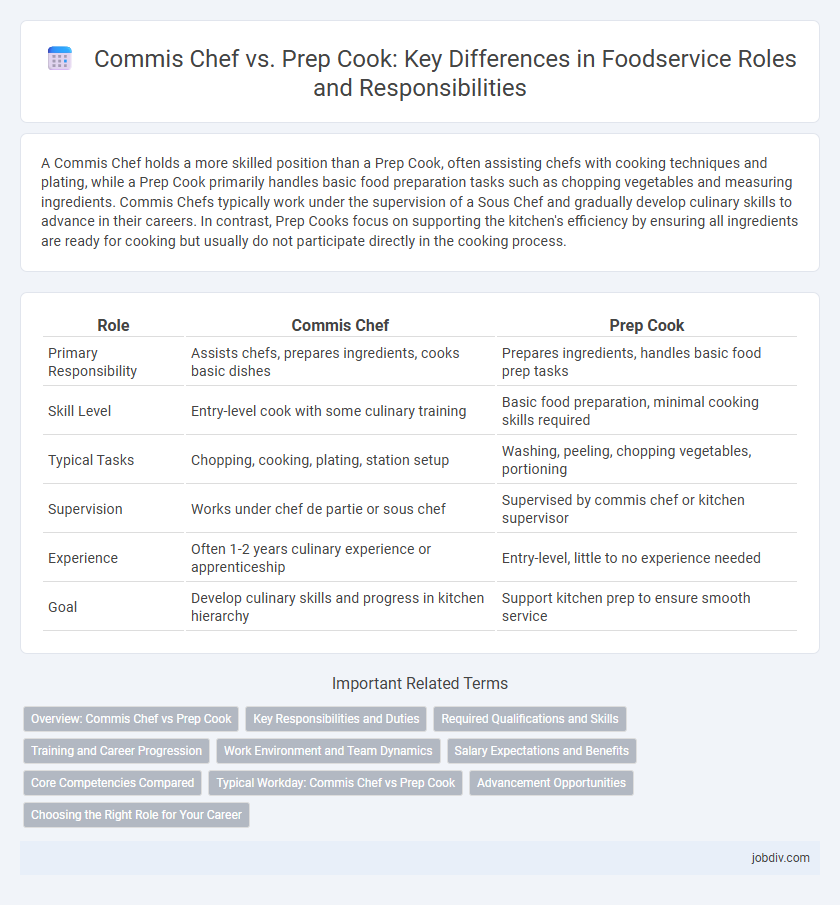A Commis Chef holds a more skilled position than a Prep Cook, often assisting chefs with cooking techniques and plating, while a Prep Cook primarily handles basic food preparation tasks such as chopping vegetables and measuring ingredients. Commis Chefs typically work under the supervision of a Sous Chef and gradually develop culinary skills to advance in their careers. In contrast, Prep Cooks focus on supporting the kitchen's efficiency by ensuring all ingredients are ready for cooking but usually do not participate directly in the cooking process.
Table of Comparison
| Role | Commis Chef | Prep Cook |
|---|---|---|
| Primary Responsibility | Assists chefs, prepares ingredients, cooks basic dishes | Prepares ingredients, handles basic food prep tasks |
| Skill Level | Entry-level cook with some culinary training | Basic food preparation, minimal cooking skills required |
| Typical Tasks | Chopping, cooking, plating, station setup | Washing, peeling, chopping vegetables, portioning |
| Supervision | Works under chef de partie or sous chef | Supervised by commis chef or kitchen supervisor |
| Experience | Often 1-2 years culinary experience or apprenticeship | Entry-level, little to no experience needed |
| Goal | Develop culinary skills and progress in kitchen hierarchy | Support kitchen prep to ensure smooth service |
Overview: Commis Chef vs Prep Cook
A Commis Chef typically holds a junior role in the kitchen hierarchy, responsible for assisting higher-level chefs with basic cooking tasks and learning essential culinary skills. A Prep Cook focuses primarily on preparing ingredients, such as chopping vegetables and measuring portions, to streamline the cooking process. Both roles are crucial in foodservice operations, but the Commis Chef is more involved in actual cooking, while the Prep Cook emphasizes ingredient preparation.
Key Responsibilities and Duties
A Commis Chef is responsible for basic food preparation tasks, assisting chefs in cooking and plating dishes, and maintaining kitchen cleanliness, while a Prep Cook primarily focuses on preparing ingredients such as chopping vegetables, measuring portions, and organizing supplies to streamline kitchen operations. Commis Chefs often handle more complex cooking duties under supervision, including seasoning and portion control, whereas Prep Cooks concentrate on mise en place to support efficient service during peak hours. Both roles require adherence to food safety standards and collaboration with kitchen staff to ensure timely meal production.
Required Qualifications and Skills
Commis Chefs typically require formal culinary education or apprenticeships combined with foundational knife skills, food safety knowledge, and basic cooking techniques. Prep Cooks often need minimal formal training but must demonstrate strong organizational skills, attention to detail, and the ability to follow instructions accurately for ingredient preparation. Both roles demand stamina, teamwork, and adaptability in a fast-paced kitchen environment.
Training and Career Progression
Commis chefs undergo comprehensive culinary training that includes mastering basic cooking techniques and kitchen operations, positioning them for advancement to higher chef roles such as chef de partie or sous chef. Prep cooks typically receive on-the-job training focused on food preparation and kitchen support tasks, limiting their career progression primarily to senior prep cook or kitchen assistant roles. Investment in formal culinary education and practical experience significantly impacts career growth opportunities for commis chefs compared to prep cooks.
Work Environment and Team Dynamics
Commis chefs typically work in fast-paced kitchen environments where collaboration with sous chefs and line cooks is essential for efficient service, often handling more complex cooking tasks. Prep cooks mainly operate in the back-of-house, focusing on ingredient preparation and inventory management, usually with less direct interaction with senior kitchen staff. Team dynamics for commis chefs involve active learning and communication within hot production teams, whereas prep cooks contribute through supporting roles that maintain kitchen organization and readiness.
Salary Expectations and Benefits
Commis Chefs typically earn a higher starting salary than Prep Cooks, with average annual wages ranging from $25,000 to $35,000 compared to $20,000 to $28,000 for Prep Cooks. Benefits for Commis Chefs often include paid training, meal allowances, and opportunities for career advancement, while Prep Cooks may receive basic health benefits and limited scheduling flexibility. Salary growth potential is stronger for Commis Chefs due to their hands-on kitchen experience and skill development in professional foodservice environments.
Core Competencies Compared
Commis Chefs demonstrate advanced culinary skills, including knife techniques, ingredient preparation, and basic cooking methods, while Prep Cooks primarily focus on organizing ingredients and maintaining kitchen hygiene. Commis Chefs excel in time management and multitasking under pressure, ensuring consistent food quality, whereas Prep Cooks provide foundational support through precise ingredient measurement and basic food assembly. Mastery of kitchen safety protocols is essential for both roles, but Commis Chefs often engage more in food plating and recipe execution.
Typical Workday: Commis Chef vs Prep Cook
A typical workday for a commis chef involves assisting senior chefs with cooking tasks, preparing ingredients, and maintaining kitchen cleanliness, often working on more complex culinary techniques. Prep cooks focus primarily on washing, chopping, and portioning ingredients to ensure smooth service flow. Both roles require stamina and attention to detail, but commis chefs usually gain more hands-on cooking experience within a brigade kitchen system.
Advancement Opportunities
Commis chefs often have greater advancement opportunities due to their hands-on experience in cooking techniques and exposure to kitchen operations, positioning them for roles like chef de partie or sous chef. Prep cooks typically start with basic food preparation tasks, limiting immediate progression but providing a foundation for moving into commis chef roles with skill development. Career growth in foodservice kitchens favors commis chefs for quicker transitions to supervisory and specialized cooking positions.
Choosing the Right Role for Your Career
Commis chefs engage in foundational cooking skills and kitchen station rotation, ideal for building culinary expertise and advancing to higher chef positions. Prep cooks focus on ingredient preparation and support tasks, providing essential kitchen efficiency but limited direct cooking experience. Choosing the right role depends on career goals: commis chef offers a clear culinary career path, while prep cook suits those seeking entry-level positions or short-term kitchen experience.
Commis Chef vs Prep Cook Infographic

 jobdiv.com
jobdiv.com